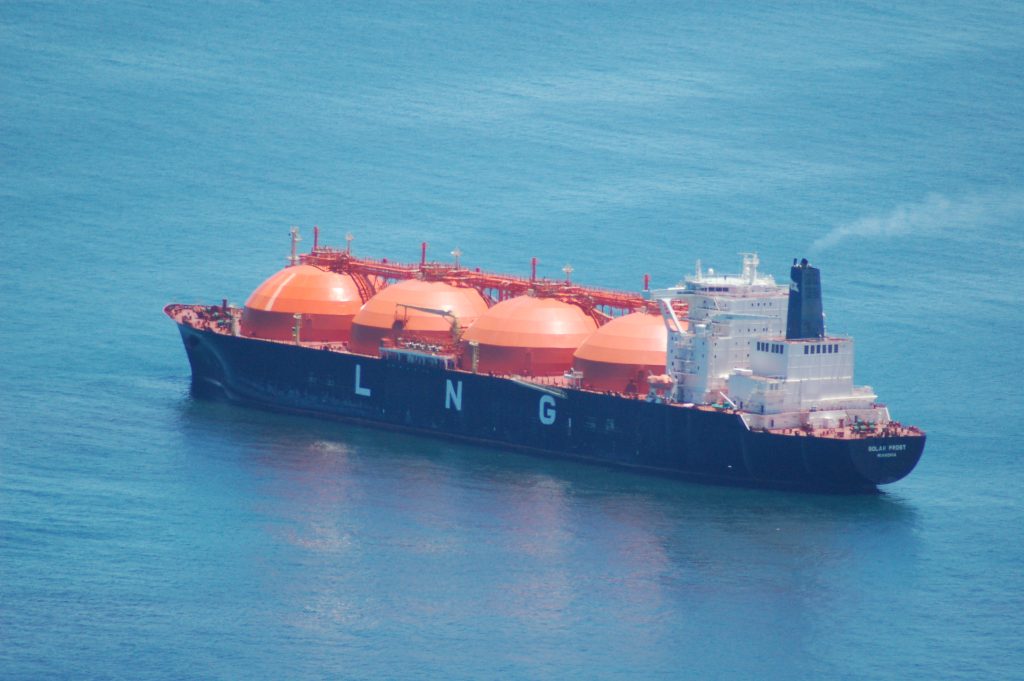ANALYSIS
Africa and the Global LNG Crisis: Energy Security & Development

Le Sommet des dirigeants États-Unis-Afrique de décembre 2022 organisé par le président Biden à Washington a souligné le rôle émergent de l’Afrique dans les affaires mondiales, y compris dans la concurrence avec la Chine et la Russie.
Dans son allocution au Sommet, le président Biden a approuvé la proposition d’adhésion de l’Union africaine au G20 et a promis 55 milliards de dollars de financement et d’investissement sur trois ans. Ce rôle ascendant était également évident lors de la réunion de novembre de la COP27 en Égypte, où les pays africains ont bénéficié d’une présence beaucoup plus active et énergique. Même s’ils sont des contributeurs marginaux aux émissions mondiales ( 3,8 % des émissions de carbone ) et au commerce mondial (3 % des exportations), l’Afrique a connu de graves conditions de sécheresse ainsi que des impacts économiques et sociaux négatifs dus aux prix élevés de l’énergie, des denrées alimentaires et des matières premières au cours de l’année écoulée.
Un rapport du FMI conclut que l’Afrique subsaharienne est « la région du monde la plus vulnérable au changement climatique ». Et les représentants du Ghana ont été les leaders des appels du G77 pour la prise en charge des pertes et dommages, une facilité dont le principe a été accepté au dernier moment dans la déclaration finale de la COP27.
Le développement et l’investissement énergétiques ont été l’un des nombreux sujets importants abordés lors du Sommet des dirigeants africains, qui s’est déroulé dans le contexte de la poursuite de la guerre en Ukraine, des prix élevés de l’énergie et des matières premières et d’un grave problème d’endettement dans de nombreux pays de la région.
Comme ce fut le cas lors du premier sommet africain il y a huit ans, le gouvernement américain a mis l’accent sur le développement des énergies renouvelables et l’amélioration de l’accès à l’énergie, notant les plus d’un milliard de dollars fournis jusqu’à présent sous l’administration Biden par la US Development Finance Corporation, l’Agence américaine pour le développement international, et d’autres agences gouvernementales américaines pour des projets africains dans ces domaines.
Bien que les dirigeants africains adoptent la transition vers une énergie propre et que la région dispose d’énormes ressources d’énergies renouvelables diversifiées, ils affirment également qu’ils doivent être en mesure de développer leurs ressources énergétiques fossiles pour répondre à leurs besoins de développement économique et donner accès à l’énergie moderne à leurs populations.
Lors de la COP27, le président de la Banque africaine de développement a soutenu le développement du gaz naturel sur le continent, notant que même un triplement de la production de gaz n’entraînerait qu’une augmentation minime des émissions mondiales de CO2.
Lors du forum de mai 2022 sur l’énergie durable pour tous à Kigali, au Rwanda, dix pays africains (République démocratique du Congo, Ghana, Kenya, Malawi, Maroc, Nigeria, Rwanda, Sénégal, Ouganda et Zimbabwe) ont approuvé une déclaration appelant à un soutien international pour “l’Afrique dans le déploiement du gaz comme carburant de transition et le remplacement à long terme du gaz par les énergies renouvelables et l’hydrogène vert pour le développement industriel, s’il est financièrement et techniquement durable”.
La guerre en Ukraine, les prix élevés de l’énergie et les approvisionnements limités ont encouragé les sociétés énergétiques internationales à envisager des projets pétroliers et gaziers en Afrique qui ne semblaient pas viables il y a quelques années. On s’attend généralement à ce que les approvisionnements mondiaux en gaz naturel liquéfié (GNL) restent serrés, comme en témoignent les analyses de l’Agence internationale de l’énergie, de Bloomberg et d’autres, y compris la récente déclaration du PDG d’Exxon Mobil, Darren Woods , selon laquelle le monde sera confronté à une pénurie. de GNL jusqu’en 2026. Les efforts de l’Europe pour remplacer le gaz russe sont le principal moteur, les besoins d’importation de GNL de l’UE étant prévus par Bloomberg pour augmenter de 44 millions de tonnes métriques d’ici 2026.
L’Afrique est une source potentielle de diversification du gaz dans l’UE et dans le monde et la stratégie d’engagement énergétique extérieur de l’UE de mai 2022 reconnaît ce potentiel. De nouveaux fournisseurs africains font leur apparition, la première expédition de GNL en provenance du Mozambique, riche en gaz, ayant lieu en novembre 2022.
Selon le BP Statistical Review of World Energy 2022 , l’Afrique a produit environ 257 milliards de mètres cubes (bcm) de gaz naturel en 2021 et exporté 58,5 milliards de m3 de GNL (42 millions de tonnes), soit environ 5,7 % des exportations mondiales de GNL. Selon certaines estimations, les exportations africaines de GNL devraient atteindre 60 millions de tonnes en 2025 et 74 millions d’ici 2030. Les principales exportations des grandes réserves de gaz d’Afrique de l’Est ne sont cependant pas attendues avant 2026 au Mozambique .et 2029-2030 en Tanzanie. Bloomberg prévoit une augmentation de la capacité d’exportation de GNL de 12,4 millions de tonnes entre 2021 et 2026 en provenance du Nigeria, de la Mauritanie, du Congo, de la Guinée équatoriale et du Mozambique.
L’Afrique pourrait augmenter considérablement ses exportations de GNL si l’approvisionnement en gaz et d’autres goulots d’étranglement dans l’utilisation de la capacité existante peuvent être surmontés. Selon Natural Gas World , l’utilisation par l’Afrique de sa capacité de liquéfaction de 78 milliards de mètres cubes n’était que de 58 % l’année dernière, l’Algérie, le Nigeria et l’Égypte fonctionnant tous en dessous de leur capacité.
Un potentiel de développement du gaz existe dans de nombreux autres pays africains, notamment le Ghana, le Sénégal et la Côte d’Ivoire en Afrique de l’Ouest. Le Ghana est un exemple avec pas moins de 3 billions de pieds cubes (tcf) de réserves potentielles de gaz, avec 1,5 à 2 tcf possibles dans les champs offshore Jubilee et TEN de Tullow Oil. Au Ghana, partenaire de longue date des États-Unis à travers son programme Power Africa, le développement du gaz domestique lui a permis d’augmenter l’utilisation du gaz dans le secteur de l’électricité, en remplacement du pétrole et en complément de sa production hydroélectrique.
Le pays, cependant, fait face à une grave situation d’endettement, stimulée en grande partie par le déficit quasi budgétaire dans le secteur de l’électricité ; et, le 12 décembre, le FMI a annoncé un accord du personnel pour une facilité élargie de crédit d’environ 3 milliards de dollars. Le gouvernement s’est engagé dans sa contribution déterminée au niveau national (NDC) à réduire les émissions de GES de 64 millions de tonnes d’ici 2030 et dispose d’un plan directeur d’énergies renouvelables qui envisage d’ajouter 1390 mégawatts d’énergie éolienne et solaire d’ici 2030.
Le développement des énergies renouvelables, qui n’en est qu’à un État très naissant, peut faciliter la diversification du mix électrique du Ghana et, avec le développement réussi du gaz, atteindre une position qui lui permettrait d’exporter du gaz contre de précieuses devises étrangères.
Les pays africains sont donc confrontés au défi de trouver un équilibre entre la sécurité énergétique, le changement climatique et les objectifs de développement durable. Il est de plus en plus clair que l’Afrique est essentielle pour résoudre les problèmes énergétiques mondiaux et devrait, comme le président sud-africain l’a récemment soutenu, avoir des voix supplémentaires au sein du G20 et d’autres forums internationaux. Il est de plus en plus clair que le gaz naturel est un moyen clé de réduire rapidement l’utilisation mondiale du charbon, en particulier dans la région Asie-Pacifique à forte intensité de charbon, qui représentait la moitié des émissions mondiales de CO2 liées à l’énergie en 2021.
La hausse attendue des prix d’un GNL La crise pourrait ralentir l’adoption du gaz naturel, en particulier chez les importateurs asiatiques de GNL (c’est-à-dire que Bloomberg voit des baisses possibles des niveaux d’importation de GNL en 2023 par rapport aux importations prévues en 2021 en Inde, au Pakistan, au Bangladesh, en Thaïlande, au Vietnam et aux Philippines).
Dr Robert F. Ichord Jr.
-

 ANALYSIS10 month ago
ANALYSIS10 month agoThe 3 African countries richest in natural resources
-

 FOCUS ONA1 an ago
FOCUS ONA1 an agoThe 10 largest oil refineries in Africa
-

 NEWS2 ans ago
NEWS2 ans agoRanking of oil producers: Here are the Top 10 African countries.
-

 NEWS7 month ago
NEWS7 month agoTop 10 des pays africains producteur de l’or : Mali 2-eme, Burkina Faso 3-eme
-

 FOCUS ONA7 month ago
FOCUS ONA7 month agoTop 10 oil producers in Africa in 2023
-

 NEWS1 an ago
NEWS1 an agoTop 20 oil producing countries in 2022
-

 NEWS4 month ago
NEWS4 month agoAfrica's 10 largest natural gas production fields.
-

 NEWS7 month ago
NEWS7 month agoIvory Coast: Eni to deploy a cylindrical FPSO and a converted FSO on the Baleine oil field













